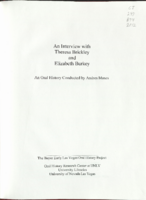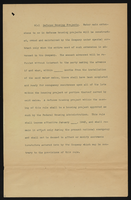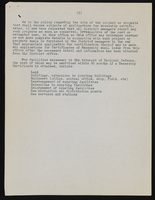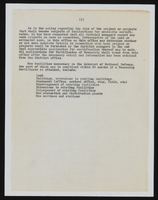Search the Special Collections and Archives Portal
Search Results

Transcript of interview with William Brymer by Rob Mullaney, March 9, 1979
Date
1979-03-09
Description
Rob Mullaney interviews William “Bill” Brymer (born 1916 in Cambria, Illinois) about his experience living in Las Vegas, Nevada. Brymer explains how he moved to Las Vegas for the gaming attractions and eventually married and had two children. Brymer worked as a craps dealer at the Frontier Club in Downtown Las Vegas and also at the Last Frontier on the Las Vegas Strip. He later worked as a pit boss at the Sahara. Brymer also discusses a visit by Lyndon B. Johnson, the early atomic testing, the importance of religion in his life, changes in climate, the development of the Strip, the existence and decline of agriculture, and some of the entertainers who performed on the Strip.
Text

Transcript of interview with Ferren W. Bunker by Debra Leu, July 02, 1975
Date
1975-07-02
Archival Collection
Description
Debra Leu interviews his friend, agriculture teacher, Ferren W. Bunker (born June 16th, 1918 in Bunkerville, Nevada) in the Bunker home. In addition to being born in Bunkerville, Bunker has lived in Reno, Caliente and Las Vegas, Nevada. During the interview, Bunker discusses early above ground atomic tests, economic and environmental changes, and his heritage as a native Nevadan pioneer and old-timer. Employment is also discussed, as he describes what it was like working as Clark County Cooperative Extension Agent, in the early days.
Text

Transcript of interview with Carey Burke by Drew Casale, February 23, 1980
Date
1980-02-23
Archival Collection
Description
Drew Casale interviews Carey Burke (b. 1936 in Columbus, Ohio) about his experience living in Nevada. Burke discusses moving to Henderson, Nevada with his family at a young age and eventually living in Las Vegas. Burke also discusses some the occupations he held, including his profession at the time as a passenger service agent for an airline company. He then talks about McCarran Airport and the various airlines in existence over time before talking about the development of the Downtown and Strip areas over time. The interview concludes with Burke describing his casino gaming chip collection, a hobby that evolved from an earlier hobby of coin collecting.
Text

Transcript of interview with Theresa Brickley and Liz Burkey by Andres Moses, January 27, 2006
Date
2006-01-27
Archival Collection
Description
Theresa Brickley and Elizabeth Burkey come from very different corners of the world, but were united by dance in Las Vegas. Theresa was bom and raised in Tokyo, and immigrated to the United States with her American husband. Elizabeth, better known as Liz, was bom in Detroit, Michigan into a family of performance artists. Theresa's first dance job was disrupted by World War II, while Liz's break came when becoming a Rockette at Radio City Music Hall. Migrating to Las Vegas from Seattle and California respectively, the two met as performers in the Sun City Dance Company, and became the best of friends. They have performed all over the city, including Sahara, Rio, and Mirage, to name a few.
Text

Transcript of interview with David Bartlett by Claytee D. White, August 23, 2013
Date
2013-08-23
Archival Collection
Description
David Bartlett’s Nevada roots run far and deep. He was born in Las Vegas in 1940, his family moved to Reno when David was in grade school. A great joy was for him to return to Las Vegas and spend time with both sets of grandparents: David and Julia Lorenzi (maternal) and Byron and Dessa Bartlett (paternal). In local history, both families represent the early entrepreneurship and craftsmanship of residents: from the Bartlett Brothers Hardware to Grandfather Lorenzi’s stonework that still graces such landmarks as the grottos at St. Joan of Arc Catholic church and at Bishop Gorman High School. Of particular note is that David’s grandfather, David Lorenzi, envisioned the recreational park known as Lorenzi Park and is located in the Twin Lakes area of Las Vegas. Today David is retired from a long career in auto/truck sales. He lives in Las Vegas and is active in several community organizations including the Elks Lodge and Three Square.
Text

Transcript of interview with Billy Christ by Lisa Gioia-Acres, October 09, 2007
Date
2007-10-09
Archival Collection
Description
William “Billy” Christ, born in 1930 in Detroit, Michigan, is an accomplished bass player. His parents, Louis and Estemia Christ, were both from Albania and immigrated to Detroit in 1929. Christ’s father was a restaurant owner and his mother worked alongside his father in the restaurant business. Billy started playing the bass in high school and studied with the Detroit Symphony. Billy decided at an early age that he wanted to become a full-time musician. He attended Wayne University to study music and after two years he decided to join the Gene Krupa Band in New York. While living in New York, Billy had the good fortune to play at historical venues such as Apollo Theater, Copacabana, and Bop City. After only a few years, he left New York to join Lena Horne in San Francisco and then Billy made his way to Las Vegas in 1960. Christ’s first job in Las Vegas was on the strip at the Flamingo with the Russ Black Orchestra. Performing in Las Vegas allowed Billy to gain greater access to talented musicians and the opportunity learn from these virtuosos. As a result, Billy quickly matured into a skillful bass player and ultimately went on to work with legendary greats like Paul Anka, Tony Benett, Sammy Davis, Dean Martin, and Frank Sinatra. Billy currently lives in Las Vegas and performs weekly at The College of Southern Nevada on Wednesday nights. He has been married to his wife Alene since 1958. When asked about his philosophy on life, Billy responded, “I try not to worry about things and just take it a day at a time and try to be the best person I can be. And play every day.”
Text
Pagination
Refine my results
Content Type
Creator or Contributor
Subject
Archival Collection
Digital Project
Resource Type
Year
Material Type
Place
Language
Records Classification




